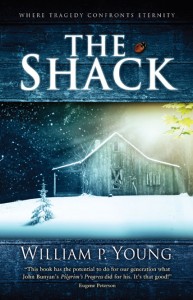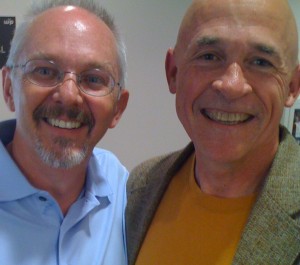Since it’s the week of Christmas we’re allowed to get all mushy and sentimental. Those of you who stop by the blog or the Oneicity Facebook page have become family. You ask questions. You poke us. You challenge us. You give answers. We share the journey. As our new friend Seth Godin would say, a Tribe has formed. Not because Oneicity is special, but because you are. And you have been willing to join us.
All these warm, fuzzy gingerbread feelings have us in the mood for another special author interview, another 8-in-8 book giveaway and a fundraising reminder about the power of story.
The interview is with Paul Young who wrote a little book titled The Shack. The book was originally self-published but has now sold well over 10 million copies. The Shack has been translated into a slew of languages, has been on best seller lists and naturally has received its share of criticism as well.
The book was originally self-published but has now sold well over 10 million copies. The Shack has been translated into a slew of languages, has been on best seller lists and naturally has received its share of criticism as well.
We’ve had the opportunity to spend time with Paul and he wouldn’t want you focusing on the number of copies or the lists or the criticism, he’d want you to know that The Shack “is a metaphor for the places you get stuck, you get hurt, you get damaged…the thing where shame or hurt is centered.”
and he wouldn’t want you focusing on the number of copies or the lists or the criticism, he’d want you to know that The Shack “is a metaphor for the places you get stuck, you get hurt, you get damaged…the thing where shame or hurt is centered.”
We’d say that The Shack is a powerful story that will touch you if you have been hurt or broken. You’ll be encouraged and blessed. If you wrestle with who God is and what God is like, you’ll be surprised and challenged. We’ll say it again: The Shack is a powerful story.
Someone who comments on the blog or on our FB page this week will get an autographed copy of The Shack that Paul gave us just for you. Paul’s the real-deal and also graciously agreed to an interview we could share with you.
Hoots and Thomas: Thanks so much for taking time to answer a few questions. So when did the plot or story of The Shack first take shape in your mind? Over what period of time did you conceive of the book?
Paul: Kim, my wife, has been asking me for a few years to write a gift for my children (6 kids ages 17-30), and as she put it, “Put in one place how you think, because you think outside the box.” I wasn’t ready until 2005, the year I turned 50. No story line, no thoughts, just a simple mandate. I began writing conversations as I rode the Max Line to one of my three jobs. These involved questions I wasn’t allowed to ask as a religious kid growing up in the church and they took on a life of their own. After a couple months I decided I had better enter the conversations into the computer so as not to lose them, and as I entered the first I wondered, who is asking and why. Mack was born and the story line fell all over the pages. First full manuscript was completed in six months well before my Christmas target.
Hoots and Thomas: Why did you write the book?
Paul: First, I wrote the book to submit to Kim’s request, but beyond that, I was writing for my children and trying to communicate to them Truth that is precious to me. The Shack will always be my legacy piece, a gift from father to sons and daughters.
Hoots and Thomas: We talk a lot on our blog and to clients about the power of story. The Shack is a great story. How would you encourage someone in a nonprofit to use the power of story to help their cause?
Paul: Story has a way of penetrating into the precious places of the heart without asking for permission. You don’t have to defend the rationality of a story, it simply is the window into another’s experience and draws us in on multiple levels. Every human being ‘is’ a story and story always involves an invitation.
Hoots and Thomas: Beautiful. All of us trying to connect people with causes to change the world need to use story more. We know that some big-time celebrities have loved the book. Without naming names, what can you tell our readers about how people they’d know through main-stream media have been touched by your story?
Paul: It has been rather astounding the level of impact the book has had on people and their families and relationships. It is as if the story has given people a language to have a conversation about God, pain, forgiveness, sadness etc, that there simply had not been words. My girls told me that I have totally ruined the idea of celebrity for them and that makes me grin. People from the upper levels of government, religion, athletics and the arts have shared with me how the little story intercepted their own journeys in transformational ways.
Hoots and Thomas: We also know that men and women in prisons are an audience that have loved your book. What can you tell us about that and how those experiences are similar (or different) than the “celebrity” experiences?
Paul: The responses from prisons or folks who are living on the fringes has been fundamentally the same as any of the celebrities. There are always some nuances, but The Shack is a uniquely ‘human’ book and seems to have found a way to rest in the places we all share. One nuance that has emerged with folks incarcerated in the prisons system is the issue of forgiveness. I wrote the section from Mackenzie’s (the victim’s) point of view, and part of Mack’s struggle is that Papa (God) had any consideration for the perpetrator. Papa communicates to Mack in no uncertain terms that even the perpetrator is a child of God and worthy of relentless affection. What I have found is that the perpetrators reading my story, read it from their point of view, not the victim’s and heard loud and clear that they are pursued by the affection of God.
Hoots and Thomas: Amazing. We hadn’t thought of how that perspective shift would occur. In the years since the book “took off” what’s the most unexpected place or person impacted by your book?
Paul: There have been many ‘unexpected’ places and people impacted by the book. Most of us share the reality of ‘Great Sadness,’ for one reason or another. It is a common cross, often unnoticed and hidden. The book has gently encouraged authenticity about those tender places and we have learned to bear each other’s burdens a bit more. I have traveled to other cultures and nations and found that the response has been largely similar. It also hasn’t seemed to matter whether a person comes from an overtly religious paradigm or one antagonistic to religion; the book has provided some common ground and grace.
Thanks so much Paul. We’re grateful for your time and for the story you told in The Shack.
The takeaway for all of us who communicate is that story, as Paul says: penetrates into the precious places of the heart without asking for permission.
If you want to move your donors (or prospective donors), tell a story. Tell a story chock-full of emotion. Tell a story that takes your donors to places they’ve never been. Tell a story that draws them into the problem you’re solving (and they’re solving). Just tell your story as only you can tell it.
What about you. Have you read The Shack? Love to know what you thought about it — even if you didn’t like it (just remember it’s a work of fiction). How do you use story in your communications?
P.S. If you haven’t read The Shack, you can read more about it here but be careful, spoilers in the Plot section.

Hoots and Thomas

4 thoughts on “our Christmas present to you”
I’m looking forward to reading the book. The thing I’ve taken from the interview is that I too thought to leave a written legacy of my life for my children. I did this in journalistic fashion, and presented it to my kids on their 18th birthdays.
Thank you for sharing the interview Kris and Steve. I thank Cassandra as well for bringing it to my attention.
@Rod — Great to hear from you. Good for you to not only want to leave a legacy in writing, but also to do the hard work of following through. What a great thing for a parent to do.
All our best to you (and maybe you’ll win the book so you can read an autographed copy).
st
One of the things that I’ve found so powerful not so much about “The Shack” but about what Paul Young is doing as a result of the “audience” response to “The Shack” is to embrace the power of one’s niche. (For the record, I understand that Paul’s niche has become forgiveness. Makes sense, doesn’t it?)
Our clients have their respective and specific niches — from serving the homeless to helping AIDS orphans in Uganda. We have our specific niche: providing income solutions for non-profits. And the power of niche to me is this: when we (or our clients) are focused and centered in our niche, we have the most momentum and response. When we stray, we get distracted and in essence minimize our efforts and the response from our consumers/donors/clients.
Wow, I have this book. Now I am going to have to read it!
Comments are closed.